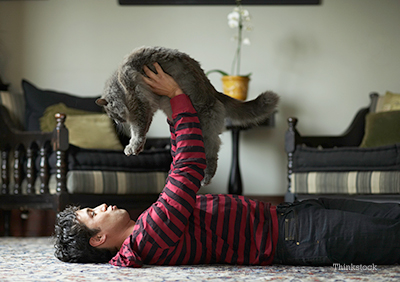
A recent conference held by the International Association of Animal Behavior Consultants in April collected some of the country’s top researchers and behavior consultants who work with cats. The event was the first of its kind created for an audience focused on helping humans work with felines with behavior problems.
Are cats misunderstood?
Despite cats being the number one pet in U.S. households (74 million cats versus 70 million dogs according to the AVMA), there is evidence to suggest that the behavior of cats may not be well understood. I was fortunate enough to attend the IAABC conference mentioned above, and I learned (from Steve Dale) that Cat guardians are less likely to be taken to the veterinarian and less likely to have money spent on their supplies, toys and other stimulating items.
Why is this? Guardians of cats often misperceive their cat’s behavior and therefore, assume the cats are fine without any extra attention. In the words of veterinary behaviorist and professor, Dr. Sharon Crowell-Davis, “most people see what they expect to see, and interpret behavior on underlying assumptions that may or may not be false.” When Dr. Davis presented on social communication and cats, she noted that we must remember, “’Social’ does not mean social in the way that humans are, dogs are, or horses are.” Every species has their own manner of social communication and when it comes to cats, we should not see them as small, aloof dogs. We should learn to read their body language and understand their habits to appreciate them for who they are.
An example of misperception Dr. Davis noted is purring, which is often seen by cat guardians as a sign that the cat is happy. While this often can be the case, a cat that is injured or sick may purr as well. Another example is a common belief (Dr. Crowell-Davis hears it often) that cats do not have facial expressions. Based on her own work with clients and cats with behavior issues, she has found facial expressions can change widely based on the cat’s behavioral state.
How can you better understand your cat?
As a companion animal behavior consultant and shelter volunteer/staff member for many years, it’s been my experience, that cats do lose out when it comes to finding help for behavior issues; compared to dogs, cats are far less likely to be taken to see a professional for help. This may be due to the lack of trained professionals available, as there are many more professional associations for the training and behavior of dogs in existence. Hopefully, organizations such as the IAABC will change this in the future. Animal Behaviorist and IAABC member Katenna Jones says, “Cats are kind of forgotten. People are stunned to find out that cats can be trained and their behavior changed, much less that I and others work with cat owners professionally to resolve their problems.” If you need help interpreting your cat’s behavior, visit our cat behavior section, the American College of Veterinary Behaviorists, the Animal Behavior Society, and the IAABC.
Click here to learn if your cat is secretly sick.
If you have any questions or concerns, you should always visit or call your veterinarian -- they are your best resource to ensure the health and well-being of your pets.
